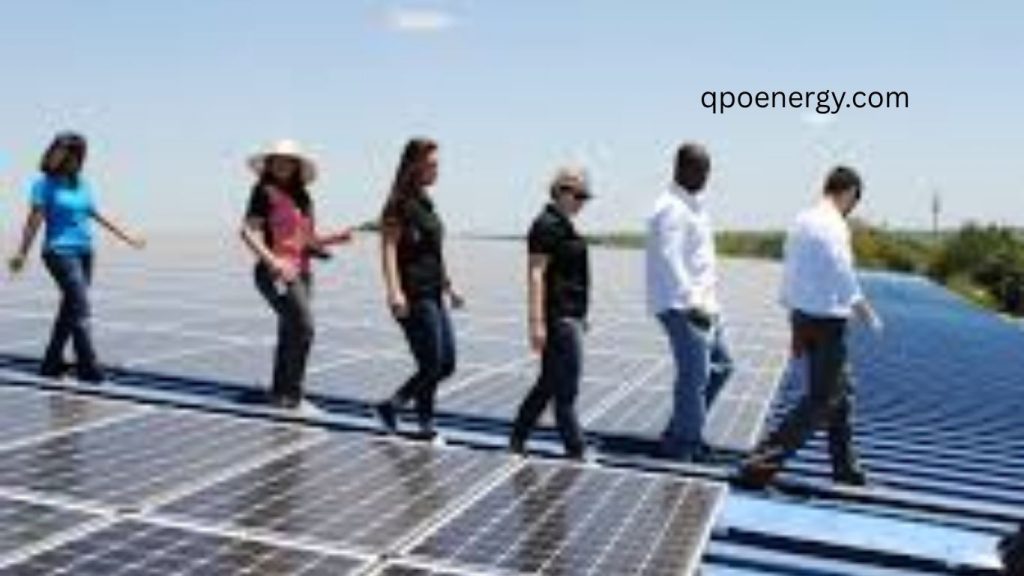Florida is taking a commanding lead in the renewable energy revolution with the launch of the Florida Solar Energy Apprenticeship Program (FSEAP) — the nation’s first solar-specific apprenticeship officially registered with the U.S. Department of Labor. This forward-thinking initiative is setting a new benchmark for solar workforce development, aligning perfectly with the state’s growing demand for clean energy and sustainable jobs.
Read More: Shock and Concern: U.S. Moves to Slash $13 Billion in Crucial Green Energy Funding
Pioneering the Future of Solar Workforce Training
The FSEAP represents a major milestone in Florida’s renewable energy journey. With eight participating employers and 20 apprentices currently enrolled, the program is actively cultivating the next generation of skilled solar professionals.
Specifically designed for residential and small commercial installations, FSEAP offers in-depth training in photovoltaics, solar pool heating, and solar water heating systems. Through real-world, hands-on experience, apprentices learn the technical and safety skills essential for success in the solar industry.
Graduates are well-prepared to earn their state solar contractor certification, enabling them to pursue rewarding careers that contribute directly to Florida’s clean energy future.
Meeting Growing Industry Demands
Florida’s solar industry has witnessed explosive growth in recent years — fueled by population expansion, abundant sunshine, and increasing consumer interest in renewable power. Yet, this growth has created a massive demand for qualified solar technicians and contractors.
“The solar industry is rapidly growing in Florida, along with our state’s population,” said Bill Johnson, President of the Florida Solar Energy Industries Association (FlaSEIA). “The Florida Solar Energy Apprenticeship Program is meeting the dual challenges of industry growth and workforce demand. We’re thrilled to see how this initiative will shape the future of our apprentices and the broader solar energy landscape in Florida.”
Through FSEAP, the state is creating a talent pipeline that will sustain long-term growth — ensuring that solar companies can meet the rising installation and maintenance needs across Florida.
Education and Industry Collaboration
Beyond the apprenticeship program, Florida’s secondary schools and higher education institutions are embracing solar training as part of their curriculum. Programs such as the Solar Energy Institute and Solar Photovoltaic System Design, Installation, and Maintenance courses are providing students with valuable career-ready skills.
At the Solar Energy Institute, classrooms are designed to simulate real-world job sites, featuring mock grids, wall-mounted electrical panels, and roof installations using multiple materials. This immersive setup enables students to apply theoretical learning in practical environments.
Graduates earn industry-recognized credentials, preparing them for the Florida Certified Solar Contractor License and aligning their training with the North American Board of Certified Energy Practitioners (NABCEP) standards — the gold standard in the solar profession.
Expanding Career and Technical Education Opportunities
Starting in August 2025, solar installation training will become an elective course within the state’s Career & Technical Education (CTE) programs. This new offering will empower students to gain early exposure to renewable energy careers while still in school.
The curriculum covers key areas including:
- Solar energy fundamentals
- Electrical systems and safety protocols
- Plumbing and roofing basics
- Battery backup integration
- Electric vehicle (EV) charging station installation
Students completing these programs will graduate with OSHA 10 Certification, NABCEP credentials, and manufacturer certifications from leading solar technology brands. These credentials give graduates a competitive advantage in an increasingly dynamic job market.
“These programs are a game-changer,” said Rick Vaske, FlaSEIA Board Member. “By introducing students to solar energy careers early, we’re building a strong workforce pipeline to support Florida’s transition to a clean energy future.”
Florida’s Rise as a Solar Powerhouse
Since 2018, Florida has been among the fastest-growing solar markets in the United States. Its vast sunshine, favorable economic conditions, and proactive policy environment have made it a magnet for solar investments.
Programs like FSEAP and the new CTE solar electives are bridging the skills gap and fueling this growth by ensuring that the local workforce can keep pace with expanding demand. The focus on hands-on education and certification also enhances job readiness and stability, making solar energy a viable and sustainable career path for many Floridians.
Addressing Challenges and Building Resilience
While Florida’s solar growth is impressive, it is not without challenges. Critics point out the need for a comprehensive energy infrastructure that can support large-scale renewable integration. Concerns remain about solar reliability during extended cloudy periods and hurricane disruptions, as well as the upfront installation costs that can deter low-income households.
Despite these challenges, solar advocates believe that strategic workforce programs like FSEAP are key to overcoming such barriers. By training more local professionals, solar projects become more cost-efficient and accessible, reducing dependence on centralized power plants and benefiting communities statewide.
Empowering Economic Growth Through Clean Energy Jobs
Workforce development in renewable energy does more than build skills — it strengthens the entire economy. As thousands of Floridians train for high-paying, sustainable energy careers, the local job market and economy will see significant growth.
Industry experts highlight that every new solar installation supports a chain of secondary jobs in logistics, engineering, sales, and maintenance. By investing in workforce readiness today, Florida is laying the foundation for long-term energy independence and economic prosperity.
“UCF’s Florida Solar Energy Center is proud to partner with FlaSEIA on both the apprenticeship program and academic solar training,” said Jim Fenton, Director of FSEC. “Florida isn’t just keeping up with the renewable energy transition — it’s leading it. The Sunshine State is truly living up to its name.”
Frequently Asked Questions:
What is the Florida Solar Energy Apprenticeship Program (FSEAP)?
The Florida Solar Energy Apprenticeship Program (FSEAP) is the nation’s first solar-specific apprenticeship registered with the U.S. Department of Labor. It provides hands-on training for individuals seeking careers in the solar energy industry, focusing on residential and small commercial installations.
How does the FSEAP help Florida’s renewable energy workforce?
The program builds a strong pipeline of skilled solar professionals, ensuring that the state can meet growing demand for solar installation, maintenance, and system design. It prepares apprentices for state certifications and long-term careers in the clean energy sector.
Who can enroll in the Florida Solar Energy Apprenticeship Program?
Anyone interested in pursuing a career in renewable energy can apply. The program partners with eight employers and welcomes individuals ready to gain real-world training and certification in solar technology and installation.
What types of solar systems are covered in the apprenticeship training?
The FSEAP offers training in photovoltaic systems, solar pool heating, and solar water heating systems. Apprentices gain practical skills through hands-on lab sessions and field experience guided by certified professionals.
How are Florida’s schools and colleges involved in solar workforce training?
Many secondary and higher education institutions in Florida have integrated solar courses through programs such as the Solar Energy Institute and Solar Photovoltaic System Design, Installation, and Maintenance. These programs simulate real-world conditions and prepare students for NABCEP and state solar contractor certifications.
When will solar training be introduced in Career & Technical Education (CTE) programs?
Starting in August 2025, solar installation training will be available as an elective in Florida’s Career & Technical Education (CTE) curriculum, helping students explore renewable energy careers at an early stage.
What economic benefits does Florida gain from solar workforce programs?
These programs drive job creation, economic growth, and local investment. By developing skilled professionals, Florida strengthens its renewable energy infrastructure while reducing dependence on costly centralized power plants.
Conclusion
Florida’s bold commitment to solar workforce development marks a defining moment in the state’s clean energy transformation. Through pioneering initiatives like the Florida Solar Energy Apprenticeship Program (FSEAP) and the integration of solar training in schools and colleges, the state is equipping its citizens with the skills needed to thrive in a rapidly evolving energy landscape. By blending education, innovation, and opportunity, Florida is not only meeting the growing demand for renewable energy but also setting the standard for economic resilience and environmental responsibility. These programs are creating thousands of high-quality jobs, strengthening local communities, and ensuring that solar power remains both accessible and sustainable for all residents.


